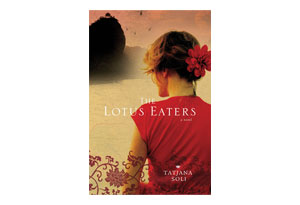Reading Questions for The Lotus Eaters
Warning: May contain spoilers

Photo: Ben Goldstein/Studio D
1. Soli pulled the novel's title, The Lotus Eaters, from an episode in Homer's The Odyssey and uses Homer's description of the land of the lotus-eaters as the novel's opening epigraph. What connection do you see between Homer's lotus-eaters and the main characters of this novel? What, if anything, in this novel acts like the lotus described by Homer, so powerful and seductive it causes one to abandon all thoughts of home? Does each character have a different "lotus" that draws them in? How does the title illuminate the main themes of the novel?
2. The novel begins with the fall of Saigon, and then moves back in time twelve years to the beginning of the war. How do you think this structure contributed to your experience of the novel? Did this glimpse of Helen in 1975 influence how you related to her character at earlier points in her life? Did knowing the outcome affect your judgment of her actions and the action of those around her?
3. Helen makes a pivotal decision at the end of Chapter 1—to send Linh on the plane and stay behind to "see it end." Why does she make this decision? How did you feel about it? Did your feelings about it change over the course of the novel?
4. What does Helen think of Vietnam and the Vietnamese people when she first arrives in Saigon? How do her feelings evolve throughout the novel? How does this evolution affect how she comes to view the war and her role in it?
5. In Chapter 3, Darrow says, "The cool thing for us is that when this one's done, there's always another one ... The war doesn't ever have to end for us." Why does he say this to Helen? What does it show about how Darrow views the war and about Darrow himself? When Helen repeats these words back to him in Chapter 11, how has their meaning changed?
6. In Chapter 19, Helen believes that "violence had poisoned them all..." In what ways are Darrow, Helen and Linh poisoned? What, if anything, keeps each of them from being destroyed by it?
7. Throughout the novel, Helen finds herself in love, and loved by, two very different men. How would you characterize each of her relationships? Did you prefer Helen in one relationship over the other? What are each relationship's strengths and weaknesses? Which man do you ultimately believe is Helen's great love?
8. Mark Twain said, "Courage is resistance to fear, mastery of fear, not absence of fear." Bravery and courage are frequently mentioned in the novel. In what ways do the various characters display these traits? In what ways do they fail?
9. What do you think the future holds for Helen at the end of the novel? For Linh?
Read O's review
Get more reading guides
2. The novel begins with the fall of Saigon, and then moves back in time twelve years to the beginning of the war. How do you think this structure contributed to your experience of the novel? Did this glimpse of Helen in 1975 influence how you related to her character at earlier points in her life? Did knowing the outcome affect your judgment of her actions and the action of those around her?
3. Helen makes a pivotal decision at the end of Chapter 1—to send Linh on the plane and stay behind to "see it end." Why does she make this decision? How did you feel about it? Did your feelings about it change over the course of the novel?
4. What does Helen think of Vietnam and the Vietnamese people when she first arrives in Saigon? How do her feelings evolve throughout the novel? How does this evolution affect how she comes to view the war and her role in it?
5. In Chapter 3, Darrow says, "The cool thing for us is that when this one's done, there's always another one ... The war doesn't ever have to end for us." Why does he say this to Helen? What does it show about how Darrow views the war and about Darrow himself? When Helen repeats these words back to him in Chapter 11, how has their meaning changed?
6. In Chapter 19, Helen believes that "violence had poisoned them all..." In what ways are Darrow, Helen and Linh poisoned? What, if anything, keeps each of them from being destroyed by it?
7. Throughout the novel, Helen finds herself in love, and loved by, two very different men. How would you characterize each of her relationships? Did you prefer Helen in one relationship over the other? What are each relationship's strengths and weaknesses? Which man do you ultimately believe is Helen's great love?
8. Mark Twain said, "Courage is resistance to fear, mastery of fear, not absence of fear." Bravery and courage are frequently mentioned in the novel. In what ways do the various characters display these traits? In what ways do they fail?
9. What do you think the future holds for Helen at the end of the novel? For Linh?
Read O's review
Get more reading guides



